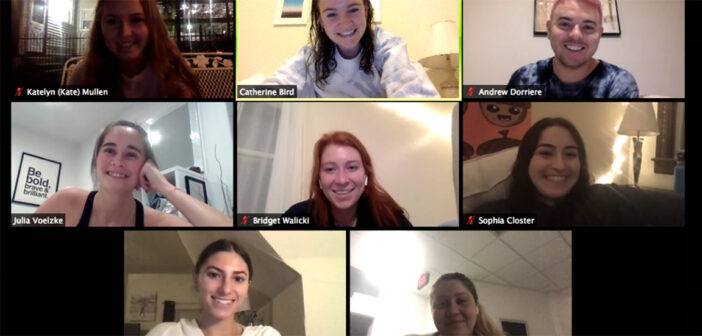Due to COVID-19, both Interfraternity and Panhellenic recruitment have been redesigned to accommodate guidelines and restrictions. However, both organizations remain optimistic about the prospects of the spring semester.
Both organizations are working to make their recruitment processes as seamless as possible while following both state and school regulations. IFC and Panhellenic, however, differ in their approaches at this point.
IFC President Preston Reed, ‘21, said as of now they are not set on a specific plan as they are still waiting to receive guidelines from the school. However, they have two contingency plans in place, one of which is completely virtual and the other a hybrid model.
The hybrid model would consist of bigger events, such as the IFC Kickoff, being done virtually and smaller events hosted by individual chapters to be held in person either on or off campus.
Reed said IFC has discussed having a socially-distanced tent on the front lawn where chapters can rent out a portion to host small events.
Panhellenic President Julia Voelzke, ‘21, said their recruitment will be completely virtual over Zoom, including bid day. Similar to IFC, they are still working on figuring out the details of the plan, but they are committed to an entirely virtual model.
The first day of recruitment, potential new members will submit videos for the chapters to review. The rest of recruitment will be done via Zoom meetings.
Voelzke said one of the biggest challenges so far has been getting chapters all to be on the same page. She said training chapter members and leaders how to use Zoom for recruitment has been difficult to do without being able to meet in person.
Finances also play a role in this year’s recruitment process, Voelzke said. They are also encouraging chapters to be as transparent as possible when discussing dues with potential new members.
“I think as it has been an issue already in the Greek and Panhel community, it is of higher consideration this year in people deciding to rush,” Voelzke said.
Panhellenic has also reduced the cost of enrollment to make recruitment accessible to more potential new members.
Kate Mullen, ‘21, Panhellenic vice president of Internal Recruitment, said a big challenge has been ensuring that effective programs and aid are implemented throughout the recruitment process. She thinks it’s important that potential new members are still able to have personal conversations with chapter members to help work out their decisions.
“It’s something that’s hard to troubleshoot for virtually just because if a (potential new member) is really upset, they’re not going to be able to talk to a (Rho-Gamma), they’ll be alone in their room, which is really disappointing,” Mullen said.
Panhellenic has implemented training resources to help ensure a more fair recruitment process.
IFC has faced similar struggles as Panhellenic in being able to communicate effectively with chapters and potential new members. Reed said their biggest challenge has been exposing all of the potential new members to the recruitment process.
“The most difficult part is reaching out to the potential new members who are freshmen, and they don’t understand how the process works,” Reed said. “We’ve seen a lot of (potential new members) who have no idea about the process.”
The organization is focusing a lot on getting the word out about recruitment through email and social media.
Lehigh’s Office of Fraternity and Sorority Affairs has compiled a multitude of resources to provide all potential members with information regarding a COVID-friendly recruitment process Additional information can be found on the OFSA website.






Comment policy
Comments posted to The Brown and White website are reviewed by a moderator before being approved. Incendiary speech or harassing language, including comments targeted at individuals, may be deemed unacceptable and not published. Spam and other soliciting will also be declined.
The Brown and White also reserves the right to not publish entirely anonymous comments.